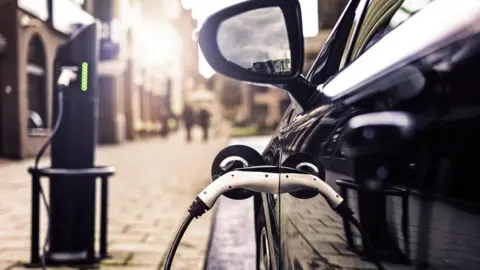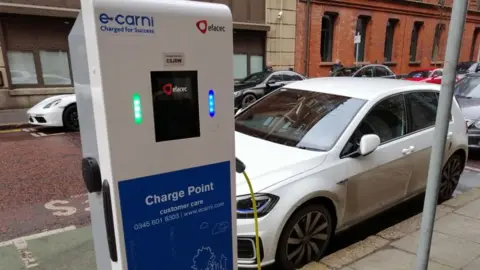Electric cars: 'Greater push needed to drive sales'
 Getty Images
Getty ImagesNorthern Ireland will not hit ambitious climate change targets unless it acts now to boost sales of electric vehicles, an industry body has warned.
In 2019, only 427 Battery Electric Vehicles (BEVs) were sold here, up just 165 on 2015.
This is despite the fact that they will be the only type of new cars on sale in 15 years.
The Society of Motor Manufacturers and Traders (SMMT) said the government must quickly spell out its plans.
"Ambitious targets must be matched by ambitious initiatives," said its chief executive, Mike Hawes.
"This includes a long-term government commitment to purchase incentives and substantial investment in infrastructure."
However, the BBC can also reveal that despite a commitment made in January 2014 to bring the total number of public charge points across Northern Ireland to 500, six years on there are only 337 such points.
A Department for Infrastructure spokesman said "funding constraints across the public sector" were to blame for the missed target, but added that 54 charge points had been installed at hospitals, health trusts, government department offices and local council offices.
"Depending on their location some of these charge points are available to staff and the public, however, they were not designed to form part of the public network," added the spokesman.
"Should public funding become available for the installation of additional charge point infrastructure, departmental officials will liaise closely with commercial providers and the Office for Low Emission Vehicles to ensure the charging infrastructure continues to remain fit for purpose."
At the time of the 2014 announcement, then Environment Minister Mark H Durkan said: "There has never been a better time for drivers to consider switching to these cars of the future."
But one Northern Ireland dealership insisted Stormont is falling far short when it comes to the issue.
'Push harder'
Caroline Willis, finance director of Shelbourne Motors, said: "We need the government to push harder to have sufficient charging points to cope with demand.
"Local government needs to add as many charging points and incentivise people to move from diesel to electric, perhaps with a swappage grant."
Asked if the government's 2035 target for BEV-only sales was still realistic, she added: "It is achievable but needs action now.
"It comes down to cost and infrastructure but mainly the latter, we need the government to push harder to have sufficient charging points to cope with demand."
Mrs Willis pointed to the huge rise in sales of self-charging Hybrid Electric Vehicles (HEVs) as proof of changing customer attitudes, adding: "More charging points could encourage the move to fully electric.
 Joseph Kearney
Joseph KearneyLast month, Transport Secretary Grant Shapps announced that funding for on-street charge points would be doubled to £10m "to make electric cars the new normal".
The Department of Transport stated that the money could pay for up to 3,600 additional charging points for motorists, who do not have an off-street parking space.
However, the Department for Infrastructure could not confirm how much of the funding would be spent in Northern Ireland.
"It is hoped that this will impact positively in relation to the Residential Charge Point Scheme," the department said.
'No chargers added'
One of those who made the leap from petrol to battery power is Colm Heaney, a father of two who lives in Belfast's Four Winds.
 Joe Kearney
Joe Kearney"I bought a used Nissan Leaf in April 2017 and received a grant for installation of a charger at my house," he said.
"However, the existing infrastructure isn't great. There have been no public chargers added, at least around where I live, since I've owned the Leaf.
"I had hoped that private companies would pick up the slack, but with a few notable exceptions (CastleCourt and Lidl come to mind), Northern Ireland does really lag behind other places."
SMMT chief Mike Hawes said that while the industry is committed to change, "blanket bans do not help short-term consumer confidence".
"Manufacturers are fully invested in a zero emissions future, with some 60 plug-in models now on the market and 34 more coming in 2020," he said.
"However, with current demand for this still expensive technology still just a fraction of sales, it's clear that accelerating an already very challenging ambition will take more than industry investment."
